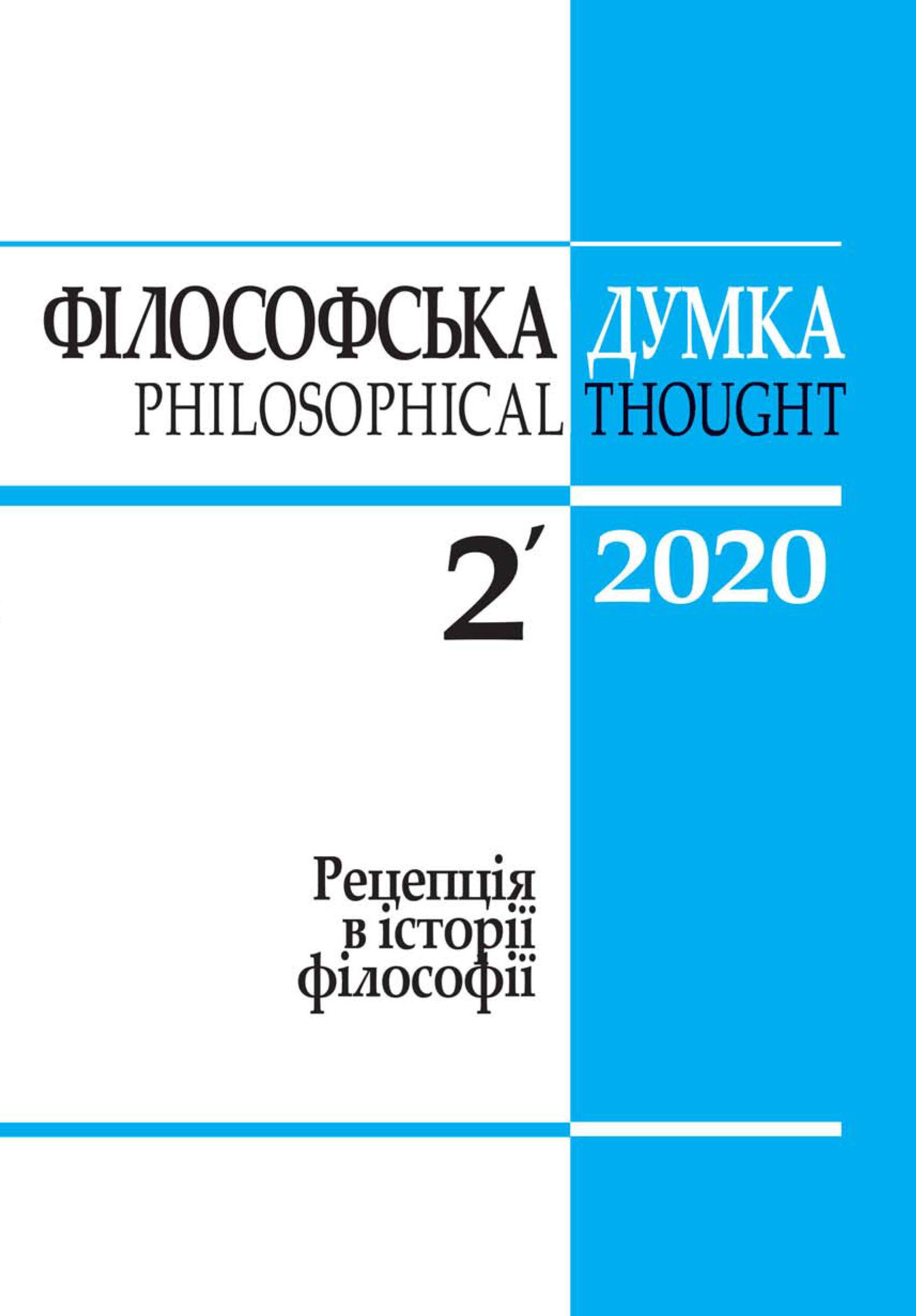Vitalii Terletsky. The concept of «reception study» in the context of methodology of the history of philosophy
THE PHENOMENON OF RECEPTION IN THE HISTORY OF PHILOSOPHY
DOI:
https://doi.org/10.15407/fd2020.02.024Keywords:
History of philosophy, methodology, reception, influence, reception aesthetics, horizon of expectationAbstract
The article analyzes the concept of «reception», which has recently gained popularity, but remains not sufficiently clarified in studies of the history of philosophy. It is assumed that the concept has become the subject of explicit methodological reflection only in the reception aesthetics (Rezeptionsästhetik) of the Constance School of Literary Studies, where it not only opposes the concept of influence, but is interpreted in the context of a horizontal structure for text understanding. At the same time, it is important to distinguish not only the «historical horizon» and the «horizon of modernity» (Gadamer), but also the «horizon of expectations» in its duality: both coded in the text itself and the life practice of the reader, «inter literary» and «external literary» horizons of expectation. The empirical trend of the reception study, developed later, makes it possible to formulate a number of specific proposals for the methodology of historical and philosophical research, which focuses on the principle of «history of receptions». It is clear that only «reproductive» and «productive» reception categories are relevant to this type of research. In particular, it is an analysis of the institutional prerequisites for the reception, the classification of the source base of that received, the channels (re)broadcast of that received, the specification of the types of scientific communication, the tradition determined positive or negative factors of reception, the status of philosophy in particular historical periods.
References
Barsch, A. (2013). Rezeptionsforschung, empirische. In: A. Nünning (Hrsg.), Metzler Lexikon Literatur- und Kulturtheorie. Ansätze - Personen - Grundbegriffe (SS. 652-654). Stuttgart: Metzler.
Blumenberg, H. (1958). Epochenschwelle und Rezeption. In: Philosophische Rundschau, VI (1/2), 94-120.
Čyževs'kyj, D. (2005). The Influence of Schelling's Philosophy (1775-1854) in Ukraine. [In Ukrainian]. In Čyževs'kyj, D. Philosophical Works in Four Volumes. Vol. 2 (pp. 164-171). Kyiv: Smoloskyp, 2005.
Ferri, M. B. (2019). The Reception of Husserlian Phenomenology in North America. Springer.
https://doi.org/10.1007/978-3-319-99185-6
Gadamer, H.-G. (1999). Wahrheit und Methode. Grundzüge einer philosophischen Hermeneutik. In: H-G. Gadamer, Gesammelte Werke (Bd. I). Tübingen: Mohr Siebeck.
Hartung, G., Pluder, V. (Hrsg.), (2015). From Hegel to Windelband: Historiography of Philosophy in the 19th Century. Berlin: de Gruyter.
https://doi.org/10.1515/9783110324822
Horskyi, V.S. (1997). The History of Ukrainian Philosophy. Course of Lectures. Third edition. [In Ukrainian]. Kyiv: Naukova Dumka.
Jauß, H. R. (1979). Literaturgeschichte als Provokation der Literaturwissenschaft. In: R. Warning (Hrsg.), Rezeptionsästhetik. Theorie und Praxis (SS. 126-162). München: Fink.
Jauß, H. R. (1987). Die Theorie der Rezeption - Rückschau auf ihre unerkannte Vorgeschichte. Konstanz: Universitätsverlag.
Jauß, H. R. (2011). Ästhetische Erfahrung und literarische Hermeneutik. Translation from German R. Sviato and P. Tarashchuk. [In Ukrainian]. Kyiv: Osnovy.
Krieger, G. (Hrsg.), (2016). Die Metaphysik des Aristoteles im Mittelalter: Rezeption und Transformation. Berlin: de Gruyter.
https://doi.org/10.1515/9781501503221
Lindenmayr, H. (1995). Rezeptionstheorie. In: J. Mittelstraß (Hrsg.), Enzyklopädie Philosophie und Wissenschaftstheorie (Bd. 3, SS. 611-613). Stuttgart: Metzler.
Moog-Grünewald, M. (1981). Einfluss und Rezeptionsforschung. In: M. Schmeling (Hrsg.), Vergleichende Literaturwissenschaft. Theorie und Praxis (SS. 49-72). Wiesbaden: Athenaion.
Moore, Chr. (Ed.), (2019). Brill's Companion to the Reception of Socrates. Brill.(???)
https://doi.org/10.1163/9789004396753
Reese, W. (1980). Literarische Rezeption. Stuttgart: Metzler.
https://doi.org/10.1007/978-3-476-03899-9
Schnackertz, H.J. (2010). Wirkung/Rezeption. In: K. Barck, M. Fontius, D. Schlenstedt, B. Steinwachs, F. Wolfzettel (Hrsg.), Ästhetische Grundbegriffe (Bd. 6, SS. 670-693). Stuttgart: Metzler.
https://doi.org/10.1007/978-3-476-00550-2_22
Stekeler-Weithofer, P. (2006). Philosophiegeschichte. Berlin: de Gruyter.
https://doi.org/10.1515/9783110193992
Windelband, W. (1923). Geschichte der abendländischen Philosophie im Altertum. München: Beck.
Yosypenko, S. (2019). The History of Philosophy and the Problem of Internal Continuity in National Philosophy. [In Ukrainian]. In Ukraina Moderna, 26, 31-49.
Downloads
-
PDF (Українська)
Downloads: 595
Published
How to Cite
Issue
Section
License
Authors who publish with this journal agree to the following terms:
- Authors retain copyright and grant the journal right of first publication.
- Authors are able to enter into separate, additional contractual arrangements for the non-exclusive distribution of the journal's published version of the work (e.g., post it to an institutional repository or publish it in a book), with an acknowledgement of its initial publication in this journal.
- Authors are permitted and encouraged to post their work online (e.g., in institutional repositories or on their website) prior to and during the submission process, as it can lead to productive exchanges, as well as earlier and greater citation of published work (See The Effect of Open Access).


